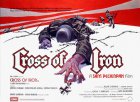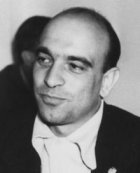
Cross of Iron
- R
- Year:
- 1977
- 119 min
- 1,023 Views
FADE IN:
THE CREDITS:
Which are SUPERIMPOSED OVER a SCENE of almost unnatural
beauty. A thickly wooded forest which practically shut out
the sunlight. All is not serene however. SHOTS RING Out --
and we are privy to a running battle between a German patrol
and a band of Russian soldiers. It is a desperate fight --
and several bodies fall. we see the faces of several men
whose identity we will learn later. The shooting is still
going on when the CREDITS come to an END. Then --
The CAMERA is MOVING SLOWLY up the hill. The verdancy of
the hill, the intermittent clusters of daisies and dandelions
are evidence of the season -- late Spring. Now the crest of
the hill is in sight; above it a patch of blue sky is
visible. The mood is pastoral, peaceful.
The CAMERA reaches the crest -- and suddenly a pair of highly
polished boots almost fills the SCREEN. The CAMERA comes
to an abrupt HALT. Then SLOWLY, the CAMERA PANS UP from the
boots to take in a carefully tailored German officer's uniform
and then the face of the German officer -- CAPTAIN STRANSKY.
It is a longish face with a high forehead and light blue
eyes. It is a face that gives an impression of extreme
forcefulness, an impression underlined by the thin - lipped
mouth and angular chin. His hair is white at the temples,
emphasizing by contrast the healthy tan of his face.
At the moment, Captain Stransky is gazing through a stereo-
telescope. His expression is grim. Behind the Captain
stands LIEUTENANT MEYER, a youngish, good-natured face.
However, it is apparent from his expression that he has
no great liking for his Captain. His lips are tight as
the Captain moves the knobs of the telescope with long thin
fingers. Captain Stransky straightens up, locks back at
Lieutenant Meyer, whose expression quickly changes to one
of impassivity. Stransky, whose demeanor is angry, says
nothing, but turns to peer again through the telescope.
2. VIEW THROUGH TELESCOPE WHAT CAPTAIN STRANSKY SEES
A patch of woods, about a square mile in area.
3. MED. SHOT STRANSKY AND MEYER
Stransky straightens up.
STRANSKY:
(angrily)
Incredible -- sheer stupidity.
cut down or destroyed by fire.
MEYER:
Excuse me, sir, but we retreated
too hastily for any such luxury.
STRANSKY:
I disagree. It was an irreparable
oversight, and I shall send a report
to that effect to Regiment.
(looks at the woods,
reaches for cigarette case )
already in those woods?
(offers Meyer a cigarette)
MEYER:
Thank you. We'II know soon enough.
Corporal Steiner is on a recconnai
sance patrol.
Stransky drops his cigarette butt, steps on it.
STRANSKY:
Reconnaissance patrols have a way
of not returning.
MEYER:
Steiner will be back.
STRANSKY:
(angrily)
I did not ask your opinion Herr
Meyer.
Meyer says nothing. We can see that he regrets his impu
dence. With a mixture of anxiety and curiosity, he waits
to see what will happen next.
The ANGLE WIDENS to TAKE IN a PRIVATE who walks up to the
Captain, salutes.
PRIVATE:
Captain Stransky? Lieutenant
Colonel Brandt Would like to see
you at headquarters.
Stransky nods, gazes sharply at Meyer, walks off, the
CAMERA TRUCKING with him. All about him are SCENES of
great activity. MEN are digging bunkers and preparing
positions. SHOUTS fill the air. As Stransky passes,
he is greeted by salutes which he acknowledges with the
briefest of nods.
4. EXT. REGIMENTAL BUNKER
An armed GUARD is on duty. He salutes smartly as .Captain
Stransky comes INTO SCENE, returns the salute without
looking at the Guard, ENTERS the bunker.
are examining a map that hangs on the wall. The older of
the two is LIEUTENANT COLONEL BRANDT. About fiftytwo,
a gaunt gray face. The younger officer is a CAPTAIN. In
his middle thirties, a tired expression, but his features
are intelligent. At the moment, he is Shaking his head.
CAPTAIN:
If our main line of resistance is
at Novorssysk, What are We doing
do��nhere?
BRANDT:
(shrugging)
We're playing fire department.
CAPTAIN:
Several hundred miles from the heart
of the fire? Does that make sense?
The door opens and a CORPORAL announces:
CORPORAL:
Captain Stransky.
Stransky APPEARS on the threshold.
BRANDT:
Come in, Captain. You know my
adjutant, of course.
STRANSKY:
Of course. How are you, Captain
Kiesel?
KIESEL:
Awful. Terrible. How are you?
Brandt laughs, Places a bottle of wine on the table.
BRANDT:
This might cheer you up, Kiesel.
Stransky inspects the label.
STRANSKY:
My respects, Colonel Brandt.
Producing a 1937 Moselle in the
southernmost corner of Russia.
BRANDT:
(fills glasses)
A bottle of Moselle is no more
absurd in this region than We
ourselves. Your health, gentlemen.
KIESEL:
I am not going to drink to my health.
My health is terrible and doesn't
deserve to be drunk to.
(holds up his glass)
To the end of the damn war.
STRANSKY:
Incidentally, Colonel, why does our
presence in the bridgehead strike
you as so absurd?
Brandt looks at Kiesel, then turns to Stransky.
BRANDT:
(ignoring the question)
Captain,
Why did you ask to be trans
ferred from France?
STRANSKY:
(laughs)
Exactly what my commanding officer
in France asked me. I can't stop
you, he Said, Since I'm convinced
that without you the eastern front
would collapse in a matter of days.
Go ahead, you heroic fathead.
KIESEL:
(quickly)
I withdraw my toast to the end of
the war. To heroic fatheads
everywhere.
Stransky doesn't know quite how to take this, but decides
on a faint, icy smile.
BRANDT:
Captain Stransky, is there any
news on Steiner?
STRANSKY:
No, sir, not yet.
Brandt shakes his head.
STRANSKY:
Incidentally, What sort is he,
Steiner?
Kiesel looks at Stransky closely.
BRANDT:
A problem....no respect, but a
first rate soldier so one looks
the Other Way.
Pause.
STRANSKY:
(a short laugh)
0f course, I've only been on this
front a few days, matter of hours
actually, but I see -- rather I
sense -- a sort of -- well, it's not
exactly insubordination -- Well, let's
call it -- a lack of respect.
KIESEL:
If I hope into a cab which gets
into an accident because the brakes
fail, I blame the driver, not the
company he works for. I'll say
that he should have refused to drive
a cab with defective brakes.
STRANSKY:
I'm not sure I know What you mean
by that.
KIESEL:
(looks at him a moment,
then easily)
I don't intend to discuss polities.
BRANDT:
(angry)
You talk avout lack of respect --
low morale..... it goes hand in hand
with impending defeat.
STRANSKY:
Defeat? I refuse to admit that
possibility.
KIESEL:
(dryly)
We'll, said, Captain.
STRANSKY:
I don't believe that the German
soldier --
KIESEL:
The German soldier!
(laughs mirthlessly)
In the early years they saw the
retreating backs of the Russians
too often to be frightened by his
face now. The replacements, on
Translation
Translate and read this script in other languages:
Select another language:
- - Select -
- 简体中文 (Chinese - Simplified)
- 繁體中文 (Chinese - Traditional)
- Español (Spanish)
- Esperanto (Esperanto)
- 日本語 (Japanese)
- Português (Portuguese)
- Deutsch (German)
- العربية (Arabic)
- Français (French)
- Русский (Russian)
- ಕನ್ನಡ (Kannada)
- 한국어 (Korean)
- עברית (Hebrew)
- Gaeilge (Irish)
- Українська (Ukrainian)
- اردو (Urdu)
- Magyar (Hungarian)
- मानक हिन्दी (Hindi)
- Indonesia (Indonesian)
- Italiano (Italian)
- தமிழ் (Tamil)
- Türkçe (Turkish)
- తెలుగు (Telugu)
- ภาษาไทย (Thai)
- Tiếng Việt (Vietnamese)
- Čeština (Czech)
- Polski (Polish)
- Bahasa Indonesia (Indonesian)
- Românește (Romanian)
- Nederlands (Dutch)
- Ελληνικά (Greek)
- Latinum (Latin)
- Svenska (Swedish)
- Dansk (Danish)
- Suomi (Finnish)
- فارسی (Persian)
- ייִדיש (Yiddish)
- հայերեն (Armenian)
- Norsk (Norwegian)
- English (English)
Citation
Use the citation below to add this screenplay to your bibliography:
Style:MLAChicagoAPA
"Cross of Iron" Scripts.com. STANDS4 LLC, 2025. Web. 3 Mar. 2025. <https://www.scripts.com/script/cross_of_iron_839>.







Discuss this script with the community:
Report Comment
We're doing our best to make sure our content is useful, accurate and safe.
If by any chance you spot an inappropriate comment while navigating through our website please use this form to let us know, and we'll take care of it shortly.
Attachment
You need to be logged in to favorite.
Log In